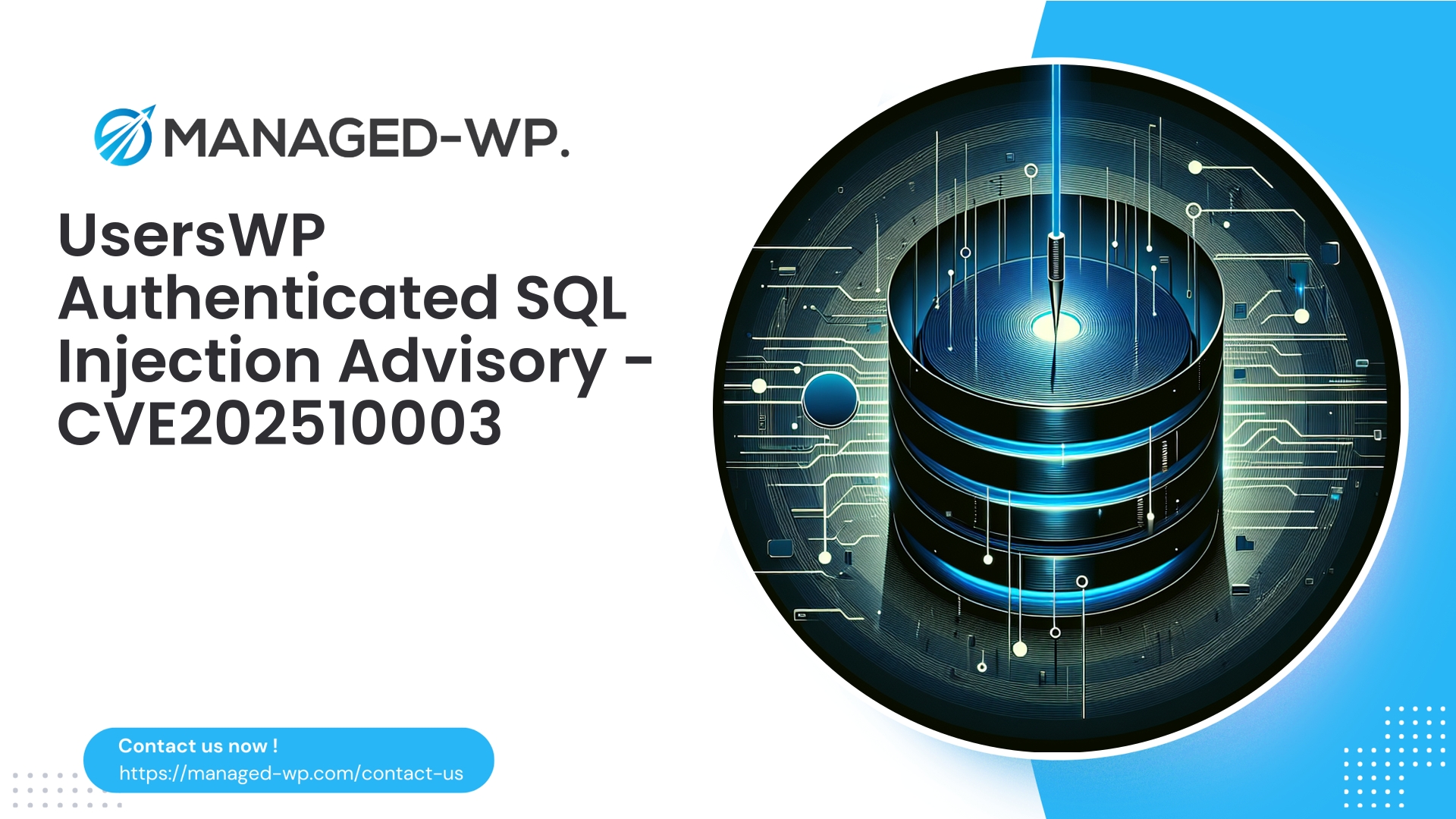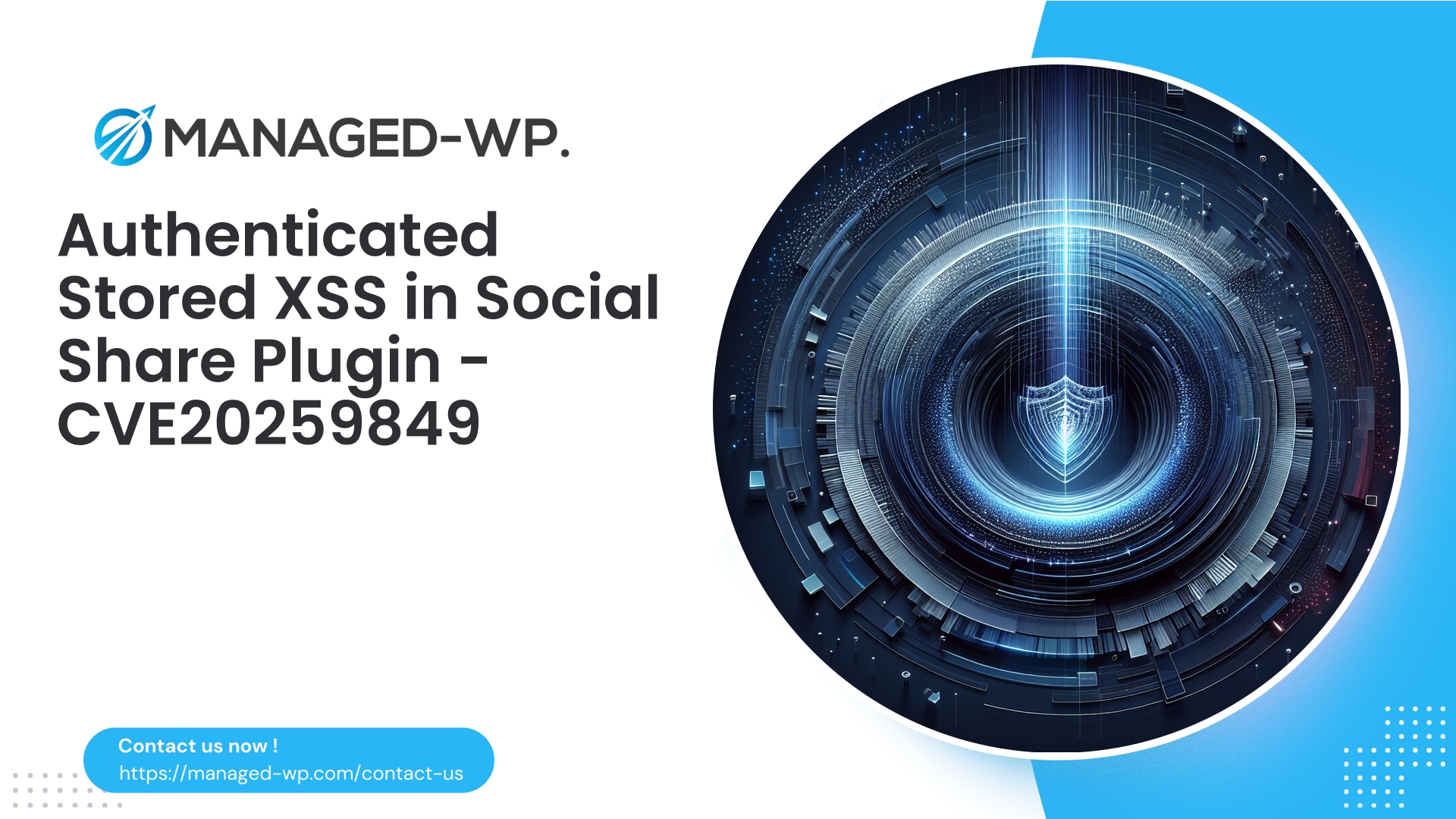| Plugin Name | UsersWP |
|---|---|
| Type of Vulnerability | SQL Injection |
| CVE Number | CVE-2025-10003 |
| Urgency | High |
| CVE Publish Date | 2025-09-06 |
| Source URL | CVE-2025-10003 |
UsersWP <= 1.2.44 — Authenticated Low-Privilege SQL Injection Vulnerability (CVE-2025-10003)
Executive Summary: Our security analysis reveals a critical SQL Injection vulnerability affecting the UsersWP plugin up to version 1.2.44, patched in 1.2.45 (CVE-2025-10003). While there is some ambiguity regarding exploit authentication—some reports indicate a requirement for a low-privilege authenticated user, others suggest the possibility of unauthenticated exploitation—Managed-WP treats this as a high-severity threat. Attackers with a low-privilege account, such as a subscriber, can inject crafted SQL payloads, potentially leading to data exfiltration, privilege escalation, and full site compromise.
This briefing serves to dissect the technical details, real-world impact, detection measures, and immediate response actions. Drawing from experience in US security operations specializing in production WordPress environments, we provide pragmatic and actionable guidance for Managed-WP clients and the broader WordPress community.
Immediate Action Summary
- Upgrade UsersWP immediately to version 1.2.45 or later – this is the only definitive resolution.
- If immediate upgrade is not feasible:
- Temporarily disable the UsersWP plugin.
- Implement Web Application Firewall (WAF) rules targeting SQL Injection attempts specific to UsersWP front-end endpoints.
- If applicable, close public user registrations and monitor existing accounts for anomalous activity.
- Conduct a comprehensive audit of logs and database activity for indicators of illicit queries, unauthorized privilege escalations, or other signs of compromise.
- Follow the incident response protocol outlined below if compromise is suspected.
Administrators managing multiple WordPress installations or client sites should assume all UsersWP instances are at immediate risk until patched.
Technical Vulnerability Overview
- Component Affected: UsersWP WordPress plugin (handles front-end login, registration, profile management, member directories).
- Vulnerable Versions: 1.2.44 and earlier
- Patched Version: 1.2.45
- CVE Reference: CVE-2025-10003
- Vulnerability Type: SQL Injection (OWASP A1 / Injection)
- Severity: High (CVSS 9.3)
- Attack Prerequisites: Low-privilege authenticated user in most known cases (subscriber role or equivalent). Due to inconsistent reporting, treat unauthenticated attack as possible and respond as a high priority.
Root Cause: UsersWP accepted user input from front-end forms—login, registration, profile updates, and member filters—without proper sanitization or safe parameterization in SQL queries. This allows crafted input to modify SQL behavior, exposing or corrupting sensitive data accessible beyond permission boundaries.
Security Impact: WordPress deployments host critical user information including credentials, email addresses, and custom content. Successful exploitation risks exposing password hashes, personal data, and potentially grants attacker control over site content and administrative roles.
Real-World Exploitation Scenarios
- Data Theft: Attackers exploit SQL Injection to query sensitive tables like wp_users and wp_usermeta, exposing password hashes, emails, tokens, and private metadata.
- Account Compromise: Known SQLi vulnerabilities can facilitate offline brute-force password cracking or unauthorized role changes, including creation of new admin users.
- Persistence & Lateral Movement: With write-access via SQLi, attackers can implant backdoors or schedule malicious tasks directly in the database.
- Automated Mass Attacks: Due to UsersWP’s widespread use in membership sites, attackers can scan and exploit vulnerable sites at scale.
Authenticated vs. Unauthenticated Attack Vector Ambiguity
Discrepancies exist in public sources: some classify the exploit as requiring authenticated low-privilege accounts; others suggest unauthenticated exploitation is feasible. Managed-WP recommends assuming the worst-case—unauthenticated or minimum privilege is enough—and act urgently.
Indicators of Compromise (IoCs) and Detection Recommendations
Early identification of exploitation attempts is crucial. Key forensic indicators include:
- Database anomalies:
- Spikes in slow queries, MySQL errors, or suspicious log entries containing SQL keywords (UNION, SELECT, /**/ comments).
- Site behavior abnormalities:
- Unexpected new admin accounts or user role escalations.
- Unusual password resets or login patterns.
- Irregular content or admin configuration changes.
- Web server & WAF logs:
- Unusual POST requests to UsersWP endpoints with SQL keywords or suspicious payloads.
- Encoded or malformed parameters suggestive of injection attempts.
- Filesystem anomalies:
- New or altered PHP files in uploads or plugin directories, unusual file timestamps.
- Suspicious user activity:
- Repeated requests from suspicious IPs, Tor exit nodes, or cloud data centers targeting member-related endpoints.
Inspection points: web server logs (Apache/Nginx), WordPress debug files, database slow query logs, WAF logs where applicable.
Priority Mitigation & Containment Steps
- Upgrade to UsersWP 1.2.45 or newer.
- Enforce this patch rollout immediately on all affected sites.
- Schedule coordinated updates if managing multiple environments.
- Temporary Measures if Upgrade is Delayed:
- Deactivate UsersWP plugin until patching possible.
- Close or restrict new user registrations.
- Require manual admin approval for new accounts.
- Deploy WAF Rules:
- Create focused rules to block SQL injection signatures on UsersWP endpoints.
- Account & Credential Hardening:
- Force password resets on administrators and privileged users.
- Rotate API keys and credentials if data leakage suspected.
- Renew WordPress salts and security keys for session protection.
- Monitoring & Forensics:
- Maintain detailed logging and monitor for unusual behavior.
- Proceed with incident response steps if indicators confirm exploitation.
WAF/Virtual Patching Guidelines
Virtual patching can provide interim protection prior to official updates. To be effective, WAF rules should:
- Target specific UsersWP front-end endpoints (login, registration, profile, members directory).
- Block requests containing SQL keywords in unexpected parameters (e.g., UNION, SELECT, INSERT, DROP).
- Flag suspicious characters encoding common in SQLi like unescaped quotes, comments (/*, –), and concatenated SQL fragments.
- Rate-limit traffic to these sensitive endpoints to deter automated attacks.
- Exclude legitimate search queries or normal form data to minimize false positives.
Note: If using Managed-WP’s security services, enable virtual patching signatures for UsersWP and configure them to block confirmed malicious activities while maintaining alerts.
Incident Response: Suspected Successful Exploitation
- Containment:
- Take the site offline or into maintenance mode immediately.
- Disable the UsersWP plugin.
- Revoke or reset all potentially compromised credentials.
- Evidence Preservation:
- Export and secure logs (web, WAF, database) for analysis.
- Create full snapshots (files and database) stored safely for forensic review.
- Eradication:
- Remove backdoors and malicious code through verified clean backups or thorough manual cleaning.
- Restore database from a pre-compromise backup if available.
- Ensure WordPress core, plugins, and themes are updated to latest secure versions.
- Recovery:
- Rebuild or restore environment from clean backups when necessary.
- Force reset all user passwords and rotate database credentials.
- Reissue all API and cryptographic keys stored in the database.
- Post-Incident Measures:
- Conduct deep security audits for lingering threats.
- Monitor logs closely for recurring issues.
- Notify affected users and stakeholders if data exfiltration is confirmed.
If unsure about recovery procedures, engage professional WordPress incident responders with US-based security expertise.
Security Hardening Recommendations
To mitigate SQL Injection and highlight best practices for future protection, adhere to the following:
- Maintain Updated Software: Promptly apply updates to WordPress core, all plugins, and themes.
- Enforce Principle of Least Privilege: Restrict user capabilities strictly; assign administrative rights sparingly.
- Secure Forms and Registrations: Implement CAPTCHAs and rate limiting to prevent abuse.
- Leverage a Robust WAF: Deploy a Web Application Firewall tailored for WordPress vulnerabilities.
- Use Parameterized Queries: Ensure all custom SQL statements use prepared statements with properly escaped inputs.
- Input Validation & Sanitization: Validate expected data types and sanitize inputs rigorously using WordPress native utilities.
- Harden Configuration: Disable file editing in WordPress dashboard, use secure database user permissions, and protect backups.
- Monitor & Alert: Enable comprehensive logging, watch for suspicious activity, and set alerting on key security events.
Developer Best Practices
Plugin and theme developers should review their SQL input handling:
- Adopt Prepared Statements:
- Incorrect:
$sql = "SELECT * FROM {$wpdb->prefix}my_table WHERE name = '" . $_POST['name'] . "'"; - Correct:
$sql = $wpdb->prepare( "SELECT * FROM {$wpdb->prefix}my_table WHERE name = %s", $_POST['name'] ); - Strict Input Validation: Cast and whitelist expected values.
- Avoid Dynamic SQL for Identifiers: Validate any dynamic table or column names against safe lists.
- Use Escaping Correctly: Escaping is a last-resort; prefer parameterization.
- Sanitize Data Prior to Use: Not just for display, but for application logic.
Testing Recommendations: Integrate static analysis, fuzz testing, and unit tests targeting input handling.
Recovery Quick-Reference Checklist
- Upgrade UsersWP to 1.2.45+ immediately.
- Disable UsersWP if immediate update is not possible.
- Rotate all administrative passwords and secrets.
- Audit user tables for unauthorized accounts or privilege escalations.
- Back up and export logs for incident investigation.
- Scan file system for unknown or modified PHP files.
- Restore database from safe backups if integrity is uncertain.
- Deploy WAF rules to block SQL injection on UsersWP endpoints.
- Reassess front-end registration and form exposure configuration.
FAQ
Q: Can this vulnerability lead to full site takeover?
A: Yes. A successful SQL Injection can expose sensitive data and enable attackers to escalate privileges or implant persistent backdoors.
Q: Is there a patch available?
A: Absolutely. UsersWP version 1.2.45 includes the necessary fix; immediate updating is critical.
Q: Will malware scanners detect if we’ve been compromised?
A: Plugin scanners help but are insufficient alone. Comprehensive detection requires log review and professional incident response.
Conclusion
The SQL Injection vulnerability in UsersWP poses a significant threat to WordPress sites due to its capacity to subvert database security via front-end forms. Managed-WP strongly advises immediate patching to version 1.2.45. Beyond patching, apply layered defenses including WAF protections, vigilant monitoring, and strict code practices to prevent future exposure.
For agencies or administrators overseeing multiple websites, maintain an up-to-date inventory of affected installations and enforce patching schedules. When immediate updates are not feasible, leverage containment measures such as plugin deactivation, closure of registrations, WAF blocking, and enhanced monitoring to reduce exposure.
Strengthen Your Security Posture with Managed-WP
Empower your WordPress installations with Managed-WP’s comprehensive security platform. Our service provides a managed firewall, scalable Web Application Firewall (WAF), malware scanning, and OWASP Top 10 mitigations to detect and block threats at the network edge — minimizing risk from vulnerabilities like this UsersWP SQL Injection.
If your site uses UsersWP and is pending an update, enable Managed-WP protections now for virtual patching and active threat mitigation.
Discover Managed-WP’s Free Plan and Get Protected Today
(Note: The Free Plan offers essential managed firewall services, unlimited bandwidth, malware detection, and WAF protections to help secure your site during update and response phases.)
If desired, Managed-WP can assist with:
- Providing detailed WAF rule sets in ModSecurity format tailored to UsersWP endpoints, optimized for low false positives.
- Delivering prioritized patch rollout checklists ready for integration into ticket systems.
- Drafting user and stakeholder notification templates for post-incident communication.
Your security is our priority — patch urgently, enforce least privilege, and assume all external inputs warrant strict validation.



















